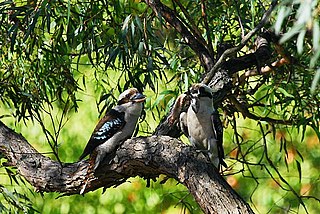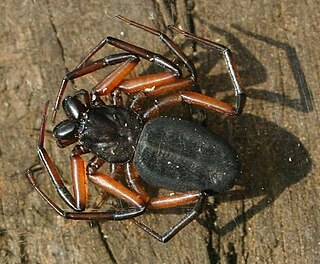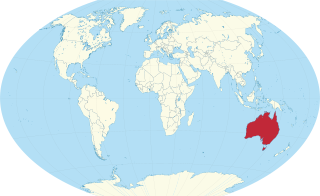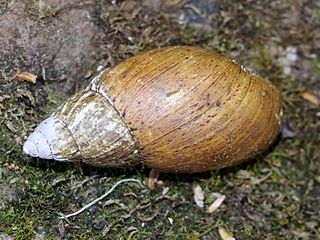
The fauna of the Australian Capital Territory includes representatives from most major Australian animal groups.

Meridolum is a genus of air-breathing land snails, terrestrial pulmonate gastropod mollusks in the family Camaenidae.
Phthersigena melania is a species of praying mantis in the family Nanomantidae. It is endemic to native to Australia's Northern Territory.

Platyoides is a genus of spiders belonging to the family Trochanteriidae. Its members are known as scorpion spiders and are found in sub-Saharan Africa and its islands, Madagascar, Réunion, Aldabra and the Canary Islands.

Nymphaea ondinea is an aquatic plant in the family Nymphaeaceae native to northwestern Australia.
Menegazzia weindorferi is a species of foliose lichen found in Australia. It was originally described by Austrian botanist Alexander Zahlbruckner as a species of Parmelia in 1907. Rolf Santesson transferred it to Menegazzia in 1942.
Chionogenes trimetra is a moth of the family Yponomeutidae. It is found in Australia.

Nitor medioximus is a species of small air-breathing land snail and terrestrial pulmonate gastropod mollusk in the family Helicarionidae. This species is endemic to Australia and grows to about 12 mm in diameter.

Pittosporum bicolor, commonly known as cheesewood or banyalla, is a flowering shrub or small tree of the family Pittosporaceae, and is native to south eastern Australia.

The northern spiny-tailed gecko is a species of lizard in the family Diplodactylidae. The species is endemic to Australia.
Ubirodynerus is a monotypic Australian genus of potter wasps. The sole species, Ubirodynerus excavatus, is regarded as a synonym of Delta excavata.

Nasutitermes walkeri, commonly known as the tree termite, is a species of arboreal termite found in eastern New South Wales and southeastern Queensland, Australia.

Eupoecila intricata is a rare species of the Australian-endemic scarab beetle genus Eupoecila. E. intricata was described by Lea (1914) as a subspecies of E. australasiae and is still often confused with the species. It was raised to species status by Allard (1995).
The Marigold Aphid,, is an aphid in the superfamily Aphidoidea in the order Hemiptera. It is a true bug and sucks sap from plants.

Pygmipanda atomata, known as the dwarf panda snail is a species of air-breathing land snail, a terrestrial pulmonate gastropod mollusc in the family Caryodidae.

Lamprolina aeneipennis is an Australian beetle species in the family of leaf beetles (Chrysomelidae), which is found in eastern Australia, in Queensland, New South Wales and Victoria, but in New South Wales only. It was first described in 1835 by Boisduval as Phyllocharis aeneipennis.
Enteles vicinus is a weevil in the Curculionidae family, which is found in north Queensland.

The quenda, also known as the southern brown bandicoot, is a small marsupial species endemic to South Western Australia.
Gonocarpus humilis, commonly known as shade raspwort, is a small herb in the genus Gonocarpus of the family Haloragaceae. Shade raspwort is common along the eastern coast of Australia, and grows in moist and shaded locations. The leaves have a rough and scabrous surface, giving the plant the common name raspwort.

Stylobasium australe is a species of shrub endemic to Western Australia. It was first described as Macrostigma australe in 1842 by William Jackson Hooker, and reassessed in 1965 as Stylobasium by Ghillean Prance.















